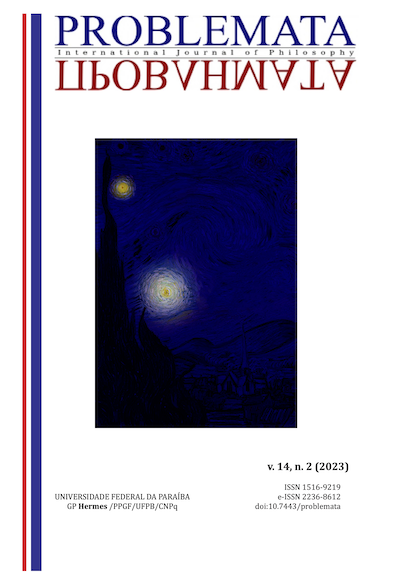IN THE CENTER OF THE DANCE FLOOR, IMPERSONAL AND FREE I AM:
CORPORAL LINKS BETWEEN PHILOSOPHY AND LITERATURE
DOI:
https://doi.org/10.7443/problemata.v14i2.67873Keywords:
Dance, Philosophy, LiteratureAbstract
In this article I propose to build some reflections on the relationship between philosophy and literature, placing myself at the center of the dance floor. It is from this place, becoming impersonal and free, that I launch some ideas about how bodily connections can serve as a reference to discuss the approximations between philosophy and literature. Merleau-Ponty's philosophy is the basis of these reflections. In this sense, I rely on your understanding that the novel enables the establishment of new worlds, as it recreates language itself and enables us to invent new ways of perceiving the world and the other. Sartre, Simone de Bouvoir and other thinkers are also present in the text, pointing out the horizons of our sensitive textures, in so far as we are in the world.
Downloads
References
BEAUVOIR, Simone. O sangue dos outros. Rio de Janeiro: Nova Fronteira, 1984.
BEAUVOIR, Simone. A convidada. Rio de Janeiro: Nova Fronteira, 1985.
BEAUVOIR, Simone. A cerimônia do Adeus. Rio de Janeiro: Nova Fronteira, 2015.
BEAUVOIR, Simone. A força da idade. Rio de Janeiro: Nova Fronteira, 2018.
DETAMBEL, Régine. Les livres prennent soins de nous: Paris: Actes Sud, 2015.
GUIMARÃES, Maira. O pensamento existencialista no romance A convidada de Simone de Beauvoir. Revista Versalete, v.5, n.8, p.181-198, 2017.
HUSSERL, Edmund. Méditations cartésiennes. Paris: Vrin, 2000.
LACOIN, Élizabeth. Zazá : Correspondance et carnets d’Elizabeth Lacoin (1914-1929). Paris : Seuil, 1991
MARQUES, Rafaela. Corpo e liberdade : possibilidade, condição e ambiguidade. Voluntas: Revista Internacional de Filosofia, v. 10, n.1, p.5-17, 2019.
MELANÇON, Jerôme. La politique dans l’adversité : Merleau-ponty aux marges de la philosophie. Genève : Métis Presses, 2018.
MERLEAU-PONTY, Maurice. Signos. São Paulo: Martins Fontes, 1991.
MERLEAU-PONTY, Maurice. Fenomenologia da percepção. São Paulo: Martins Fontes, 1994.
MERLEAU-PONTY, Maurice. Sens et non-sens. Paris: Gallimard, 1996.
MERLEAU-PONTY, Maurice. Le monde sensible et le monde de l’expression. Cours au Collège de France, Notes 1953. Genève: Metis Presses, 2011.
MERLEAU-PONTY, Maurice. Recherches sur l’usage littéraire du langage. Cours au Collège de France, Notes 1953. Genève: Metis Presses, 2013.
MERLEAU-PONTY, Maurice. Le problème de la parole. Cours au Collège de France, Notes 1953-1954. Genève: Metis Presses, 2020.
KRISTEVA, Julia. Beauvoir presente. São Paulo: SESC, 2019.
PRECIADO, Paul B. Um apartamento em Urano: crônicas da travessia. Rio de Janeiro: 2020.
SAINT AUBERT, E. Du lien des êtres aux éléments de l’être : Merleau-Ponty au tournant des années 1945-1951. Paris : Vrin, 2014.
SARTRE, Jean-Paul. O que é a literatura. Petrópolis: Vozes, 2015.
VIANA, Marcia. Liberdade e existência: os movimentos do existir em Simone de Beauvoir. Revista de estudos filosóficos, n.5, p. 118-129, 2010.
WOLF, Vírginia. Um teto todo seu. São Paulo: Tordesilhas, 2014.
Downloads
Published
Issue
Section
License
Copyright (c) 2023 Terezinha Petrucia da Nóbrega

This work is licensed under a Creative Commons Attribution 4.0 International License.
Authors who publish with this journal agree to the following terms:
- Authors retain copyright and grant the journal right of first publication with the work simultaneously licensed under a Creative Commons Attribution License that allows others to share the work with an acknowledgement of the work's authorship and initial publication in this journal.
- Authors are able to enter into separate, additional contractual arrangements for the non-exclusive distribution of the journal's published version of the work (e.g., post it to an institutional repository or publish it in a book), with an acknowledgement of its initial publication in this journal.
-
- Authors are permitted and encouraged to post their work online (e.g., in institutional repositories or on their website) prior to and during the submission process, as it can lead to productive exchanges, as well as earlier and greater citation of published work (See The Effect of Open Access).





